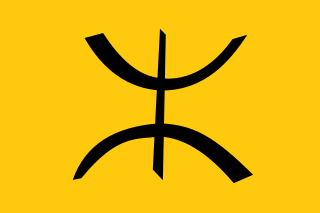Related Research Articles

The Berber languages, also known as the Amazigh languages, are a branch of the Afroasiatic language family. They comprise a group of closely related languages spoken by the Berbers, who are indigenous to North Africa. The languages were traditionally written with the ancient Libyco-Berber script, which now exists in the form of Tifinagh.

Tifinagh is an abjad script used to write the Berber languages.

The Tuareg languages constitute a group of closely related Berber languages and dialects. They are spoken by the Tuareg Berbers in large parts of Mali, Niger, Algeria, Libya and Burkina Faso, with a few speakers, the Kinnin, in Chad.

Shawiya, or Shawiya Berber, also spelt Chaouïa, is a Zenati Berber language spoken in Algeria by the Shawiya people. The language's primary speech area is the Awras Mountains in eastern Algeria and the surrounding areas, including Batna, Khenchela, Sétif, Oum El Bouaghi, Souk Ahras, Tébessa and the northern part of Biskra.

Kabyle, or Kabylian, is a Berber language spoken by the Kabyle people in the north and northeast of Algeria. It is spoken primarily in Kabylia, east of the capital Algiers and in Algiers itself, but also by various groups near Blida, such as the Beni Salah and Beni Bou Yaqob.(extinct?)
The Zenati languages are a branch of the Northern Berber language family of North Africa. They were named after the medieval Zenata Berber tribal confederation. They were first proposed in the works of French linguist Edmond Destaing (1915) (1920–23). Zenata dialects are distributed across the central Maghreb, from northeastern Morocco to just west of Algiers, and the northern Sahara, from southwestern Algeria around Bechar to Zuwara in Libya. In much of this range, they are limited to discontinuous pockets in a predominantly Arabic-speaking landscape. The most widely spoken Zenati languages are Riffian in northeastern Morocco and Shawiya in eastern Algeria, each of which have over 2 million speakers.
The Jarawa or Jrāwa were a nomadic Berber Zenata tribal confederacy, who probably converted to Christianity. The Berber tribe ruled in northwest Africa before and during the 7th century. Under queen Dihya, the tribe led the Berber resistance against the Umayyad Islamic invasion in the late 7th century.

The Chaoui people or Shawia are an Amazigh (Berber) population in Algeria inhabiting the Aurès region which spans Batna and Khenchla, Oum El Bouaghi, Biskra provinces located in and surrounded by the Aurès Mountains. They also live in Tébessa and other parts of eastern Algeria coextensive with ancient Massylii of Numidia, as well as a few adjacent towns in Tunisia. They call themselves Išawiyen/Icawiyen and speak the Shawiya language.
Arsène Roux was a French Arabist and Berberologist. He was born in Rochegude and emigrated to Morocco in his early twenties where he started studying Classical Arabic, Moroccan Arabic and the Moroccan Berber languages. In the following years, he worked in various schools and universities as a professor and director; he also founded and presided over the Collège Berbère d'Azrou.

Encyclopédie berbère is a French-language encyclopaedia dealing with subjects related to the Berbers. It was launched in 1984 under the aegis of UNESCO and is published by Editions Edisud. Its first editor-in-chief was Gabriel Camps. After his death in 2002, he was succeeded by Salem Chaker, Professor of Berber languages at the Aix-Marseille University Volume 27 appeared in 2005. Encyclopédie berbère joined from fascicle XXX, the publishing house Peeters Publishers, already engaged in Berber studies field.
Tetserret is a Western Berber language spoken by the Ait-Awari and Kel Eghlal Tuareg tribes of the Akoubounou (Akabinu) commune in Niger. This main speech area is located between Abalak, Akoubounou and Shadwanka. The variant spoken by the Kel Eghlal is called taməsəɣlalt. The Tamasheq equivalent shin-sart / shin-sar / tin-sar is used in some older literature. Popular understanding among some Ait-Awari derives the name tet-serret, and its Tamasheq equivalent shin-sart, from expressions meaning 'the (language) of Sirte'.
Dr. Michael Peyron is a specialist in the field of Berber language, literature and culture. He is also well known as a writer on tourism in Morocco.
Gabriel Camps was a French historian, founder of the Encyclopédie berbère and considered a prestigious scholar in Berber historical studies.
Centre de Recherche Berbère is a department at the Institut national des langues et civilisations orientales (INALCO) specializing in the Berber languages. It was founded in 1990 by Salem Chaker and managed by him until the end of 2009. It is headed by Abdellah Bounfour since january 2010. The center has proposed a standard for the Berber Latin alphabet.

Mitsou Ronat was a French poet, linguist and specialist of literary theory.
Karima Dirèche is a French Algerian historian specialising in the contemporary history of the Maghreb. Since September 2013, she has been the director of the Institute for Research on the Contemporary Maghreb in Tunis.

André (Alexandre) Wlodarczyk, also Andrzej (Aleksander) Włodarczyk is a Polish-French japanologist and linguist.
Abdellah Bounfour is a Moroccan linguist and philologist specialized in Berber languages, literature and culture. He is an Emeritus University Professor at Institut national des langues et civilisations orientales (INALCO) in Paris.
Si Amar u Said Boulifa was an Algerian Berberologist and teacher.
Daniela Merolla is a Professor in Amazigh / Berber Literature and Art at the INALCO, Institut National des Langues et Civilisations Orientales. Her work investigates intertextuality and multilingualism in African oral and written literatures, cinema, and websites. She developed the notion of “Amazigh/Berber literary space”.
References
- ↑ Maddy-Weitzman, Bruce (2011). The Berber Identity Movement and the Challenge to North African States. University of Texas Press. p. 115. ISBN 9780292745056.
- 1 2 "Salem Chaker". Encyclopédie berbère [Online]. Retrieved 2018-01-29.
- ↑ "Iremam - CHAKER Salem (PU)". Institut de recherches et d'études sur les mondes arabes et musulmans Iremam - UMR 7310 (in French). Retrieved 2018-01-29.